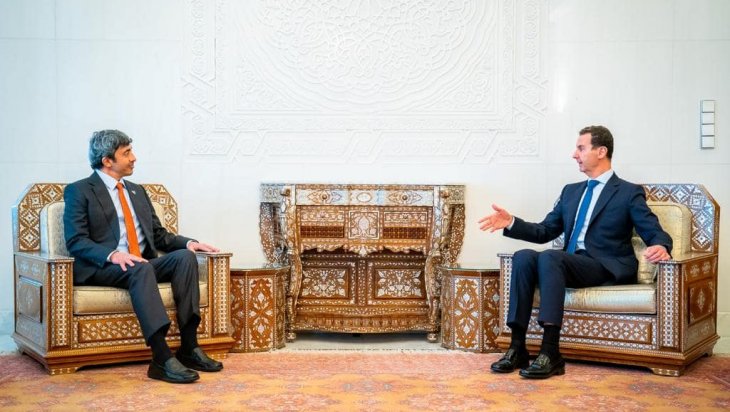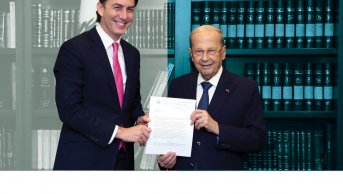Damascus-Abu Dhabi Normalization: Motivations, Areas of Cooperation, Risks

Shortly after a phone call between Bashar al-Assad and Abu Dhabi Crown Prince Mohammed bin Zayed Al-Nahyan on October 20, 2021, United Arab Emirates (UAE) Foreign Minister Abdullah bin Zayed Al Nahyan made a surprise visit to Damascus on November 9, 2021. Abdullah bin Zayed, who met with his Syrian counterpart Faisal Mekdad at Damascus Airport, then moved to the Presidential Palace with an accompanying delegation and met with Bashar al-Assad. Although there is no clear information about the details of the meeting, it can be said that this visit is one of the most concrete indicators of the recently developed cooperation between the two countries. Considering the cyclical change in the region and the efforts of the regime to return to the Arab world, the rapprochement between the two countries cannot be considered as a surprise.
Abu Dhabi's intention to improve relations with the Damascus administration began to materialize after the reopening of the Damascus Embassy in December 2018. The UAE has been one of the countries that have openly supported the regime in terms of the re-acceptance of the Damascus administration to the international community, especially from the Arab world. It can be said that the cooperation developed between the parties is closely related to the cyclical situation in the region, and the common interests arising from mutual obligations are effective in this rapprochement. From the point of view of the Damascus administration, the normalization of relations with the UAE is important in two ways: gaining legitimacy to return to the Arab world and the international system and attracting foreign investment to the country during the restructuring process. Although the regime's goals are clear at the point of developing bilateral relations, it is not possible to talk about a similar clarity for the UAE. The turmoil in US foreign policy during the Trump era and the weakening position of the Middle East in the foreign policy priorities of the Biden era have pushed the Abu Dhabi administration to new pursuits. Strong signs that the United States is inclined to withdraw from the Middle East have made it mandatory for the UAE, one of the important allies of the Washington administration in the region, to prepare for the “post-US Middle East” scenario. At this point, the development of relations with Syria occupies an important place on the foreign policy agenda of Abu Dhabi in terms of security, political and economic gains. The UAE, which wants to prevent the increasing influence of Turkey and Iran in the region by using its Arab identity, attaches importance to the return of the Damascus administration to the Arab League in terms of its regional interests. The fact that Iran and Iranian-backed groups have great influence over Syria's institutions reinforces concerns that this country will become a satellite state of Iran in the future. The possibility of Syria turning into an example of Lebanon in terms of Iranian influence means that the Arab identity that the UAE wants to use has largely lost its strength. The realization of such a scenario may pave the way for the Gulf’s ties with the Eastern Mediterranean to become problematic. Therefore, the UAE and some other Gulf states may continue to strengthen relations with the Damascus administration to combat this threat. The fact that Iran's increasing influence also creates discomfort within the Damascus administration strengthens its hand in the steps that Abu Dhabi will take in this direction.
The threat perception of the UAE is not limited to Iran. Turkey's influence in the Eastern Mediterranean, North Africa, the Horn of Africa, and even the Gulf through Qatar does not coincide with Abu Dhabi's interests. With the strengthening of relations between the UAE and the Damascus administration, Turkey's overseas influence will be broken and its focus will be completely shifted to its own borders. This occupies an important place in the UAE's foreign policy strategy. The leaked allegations that UAE Crown Prince Mohammed bin Zayed Al Nahyan offered $3 billion to Bashar Assad to launch an anti-Turkey operation in Idlib in violation of the Moscow Agreement signed on March 5, 2020, and financial aid to the YPG/SDF may be read in the context of the UAE's foreign policy strategy to undermine Turkey. Another point that intersects with the Damascus administration in Abu Dhabi's understanding of security is the policy of fighting political Islam. The threats caused by the “Arab Spring” to authoritarian regimes have started a process in which the UAE has put all groups that can be considered within the framework of political Islam, including the Muslim Brotherhood, on the terror list. The presence of many different formations adopting political Islam in Syria has set the stage for the Abu Dhabi administration and the Assad regime to act jointly in the fight against these groups.
Potential areas of cooperation between the two sides, as well as common motivations, affect the normalization of relations between the Damascus administration and the UAE. In order to crown political normalization with economic cooperation, some concrete steps have been taken by the two sides, and these steps have become more frequent recently. In particular, after the ministers of the economy of the UAE and the Damascus administration met at the EXPO 2020 event in Dubai on October 1, 2021, economic cooperation moves in bilateral relations have gained momentum. The parties have agreed on the point of re-activating the bilateral business council. On October 10, 2021, the UAE Ministry of Economy announced an agreement to develop economic cooperation with Syria and to enable new sectors. In a message shared on the social media account of the Ministry, it was emphasized that the volume of non-oil trade between the two countries reached $272 million in the first half of 2021 and that the UAE is Syria's most important trade partner on a global scale. Considering the recent developments, the message shared by the UAE Embassy in Damascus on October 5, 2021 on its social media account is also noteworthy. The embassy has published a message congratulating the Syrian leadership on the anniversary of the 1973 Arab-Israeli War. The UAE's congratulatory and solidarity messages have an important soft power effect on the reintegration of the Damascus administration into the international community. The fact that countries such as Bahrain, Oman, and Jordan also occasionally accompany such statements about the Damascus administration increases the influence that the UAE is trying to create and this constitutes an important support for the Assad regime's search for legitimacy.
The fact that Abu Dhabi is developing relations with the Damascus administration also carries some risks and vulnerabilities. Chief among these risks is the possibility of being subject to US sanctions for violating the Caesar Syria Civilian Protection Act, which entered into force in June 2020. Although the Abu Dhabi administration avoided taking this risk in the early stages of the law's entry into force, it moved away from this cautious approach and continued to develop relations with the Assad regime as the Biden administration began to take steps to withdraw from the Middle East. A statement was made by the US Department of State in connection with the visit by UAE Foreign Minister Abdullah bin Zayed to Damascus. “We are concerned about the news about this meeting and the messages it sends,” spokesman Ned Price said, noting that the US position on Assad has not changed and that they have communicated this situation to all countries in the region, including the UAE. Although the White House is being flexible towards these initiatives of the UAE, it is worth mentioning that the Caesar Act obligations carry potential risks for the Abu Dhabi administration.
The rapprochement between Syria and the UAE is undoubtedly also closely monitored by Iran as another risk factor for the UAE-Assad regime relations. Iran has not yet made a statement about this rapprochement, but it is likely that the Assad administration is concerned about its reintegration into the Arab world. In fact, the reintegration of Syria into the Arab world means that Iran's influence will be broken. Although this limited cooperation does not yet pose a threat to Iran, depending on the progress of relations, the Tehran administration may take some steps to protect its gains in Syria.
Another risk factor that may affect the rapprochement between Damascus and Abu Dhabi is the situation in Yemen. The Damascus administration is working with the Houthis, who are opposed to the UAE-backed formation in Yemen. It is possible that this situation will be reflected in bilateral relations. During this period, when relations with the UAE were gaining momentum, the Houthi military attaché in Damascus, Colonel Sharif al-Mawri, held a meeting with the head of the Military Intelligence of the Damascus administration, Kifah Melhem, on October 17, 2021. Al-Mawri conveyed his greetings to the Syrian counterpart of Major General Abdullah al-Hakim, the head of the Yemeni Military Intelligence Agency, which is affiliated with the Houthis, and conveyed information to Melhem about the situation in Yemen. This development is one of the concrete indicators that the Damascus administration is cooperating with the Houthis in terms of military intelligence in an important way. Therefore, bringing the Yemen issue to the agenda may cause tensions in Damascus-Abu Dhabi relations and damage to cooperation.
The regional interests of Damascus and Abu Dhabi coincide in many respects, and this sets the stage for the development and continuation of bilateral relations, despite some risks. Diplomatic initiatives and economic cooperation agreements have reached a high level after the UAE foreign minister's visit to Damascus with an accompanying delegation. There are expectations that the cooperation will move to an even more advanced level. Abdullah bin Zayed's visit to Damascus was first covered by Lebanese news organizations, and again, the Lebanese newspaper Al-Akhbar claimed that the UAE foreign minister invited Bashar al-Assad to Abu Dhabi. Time will tell how true this claim is, but the fact that such a visit will take place will not be a surprise given the current developments. However, if Damascus-Abu Dhabi relations gain momentum, the sanction power of the USA and adherence to the provisions of the Caesar Act may be among the most questioned issues.









